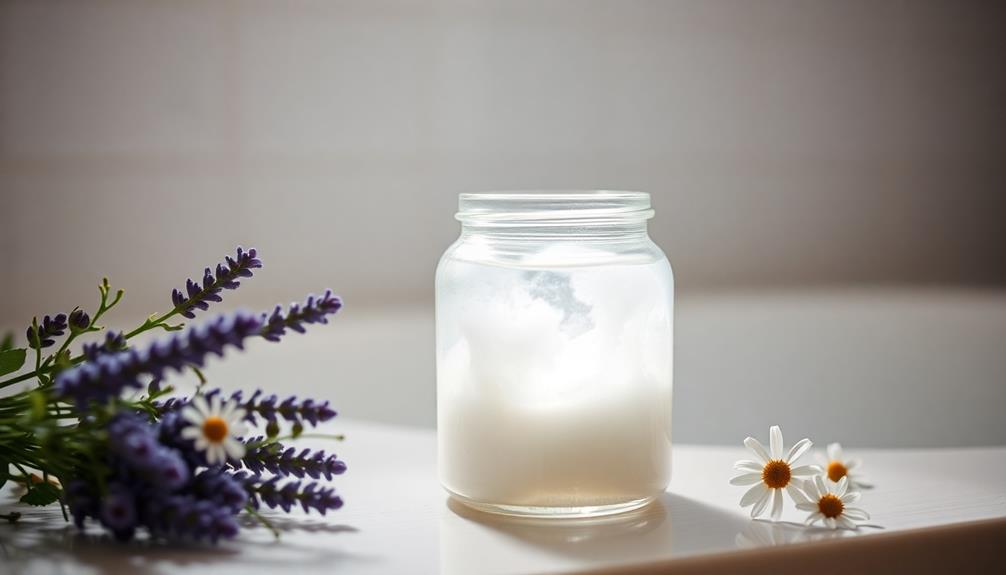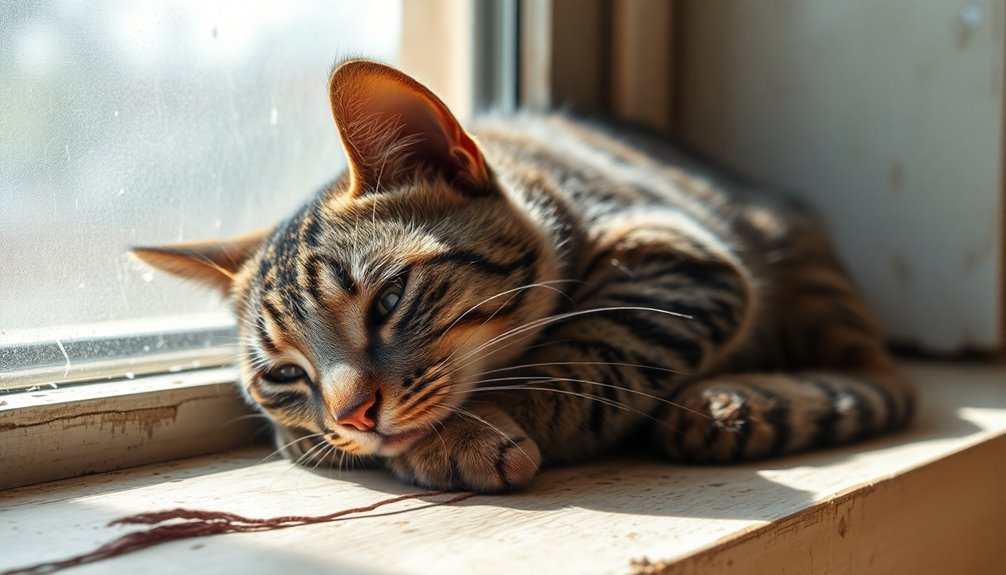Mold smells musty and damp, kind of like old socks or a wet basement. It's caused by tiny particles called microbial volatile organic compounds that mold releases into the air. This smell often sneaks up on you in dark places like basements or bathrooms, especially if there's water damage. Sometimes, the scent can be faint and earthy, hinting at hidden mold. You might not like the smell, and it can remind you of places that feel neglected. If you're curious about how to deal with mold or keep it away, there's more to discover!
Key Takeaways
- Mold typically emits a musty odor resembling dampness, rotten wood, or wet socks due to microbial volatile organic compounds (MVOCs).
- Strong mold odors indicate significant growth nearby, while faint earthy smells may suggest hidden mold or mildew.
- Common environments for mold growth include basements, bathrooms, and areas with water damage, where strong, rotten smells are prevalent.
- Mold smells can evoke discomfort and may symbolize neglect in some cultures, affecting perceptions of cleanliness in homes.
- Prolonged exposure to mold odors poses health risks, including allergic reactions and respiratory problems, especially for vulnerable populations.
Introduction

Mold smell is something you might encounter in various parts of your home, often signaling a bigger problem. When you notice a musty odor, it's usually caused by mold growth, which can be sneaky and hide in damp areas like basements, bathrooms, or even kitchens.
Mold releases tiny particles called volatile organic compounds, or MVOCs, which create that unpleasant smell you might associate with wet socks or rotten wood.
While the smell can be annoying, it's important to remember that it also signals potential health risks. Breathing in mold spores can affect your indoor air quality and might make you feel unwell.
Different types of mold can produce different odors, ranging from sour scents to stronger smells that might remind you of fermenting food. If you catch a whiff of something odd, don't ignore it!
Checking for moisture and taking action can help keep your home safe and healthy. By addressing those musty odors, you'll not only improve your indoor air quality but also ensure your living space is cozy and inviting.
Stay alert, and don't let mold take over your happy home!
Description of the Smell
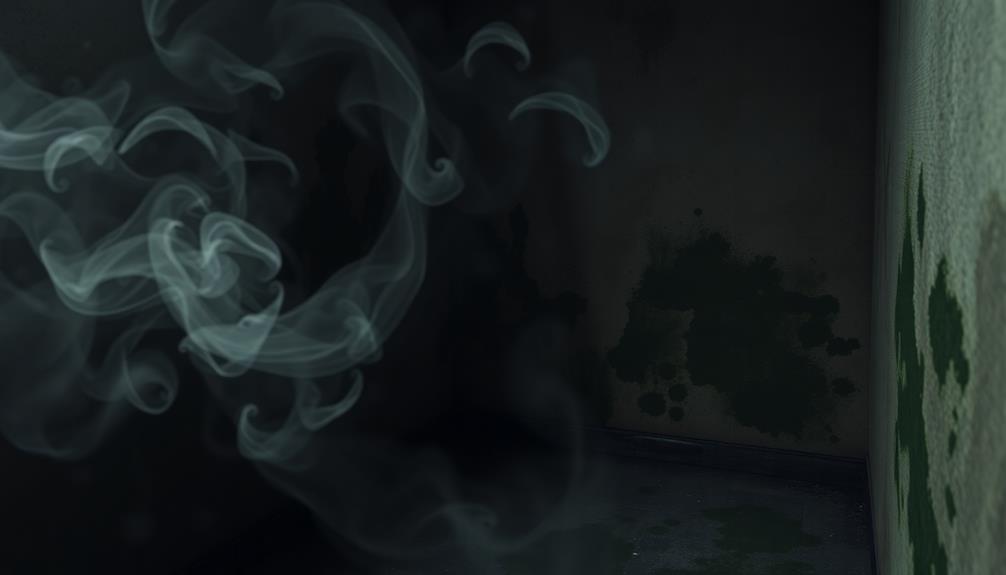
When you encounter that musty smell, it often resembles dampness or stale air, reminiscent of wet socks or decaying wood. This musty odor comes from mold, which releases tiny particles called microbial volatile organic compounds, or MVOCs, as it grows. If the smell is strong, it usually means there's significant mold growth nearby. A faint earthy smell might suggest hidden mold or mildew lurking in the shadows.
Different types of mold can create unique odors. For example, black mold can give off a pungent, meaty smell, while others might smell sour or tangy, similar to fermenting fruit. No matter the type, mold smells are often unpleasant and seem to stick around, even after you clean or air out the space. This makes them important clues for finding mold infestations that might need a professional inspection.
Environmental factors, like moisture levels and the presence of organic material, play a big role in how strong the smell is.
Source and Composition
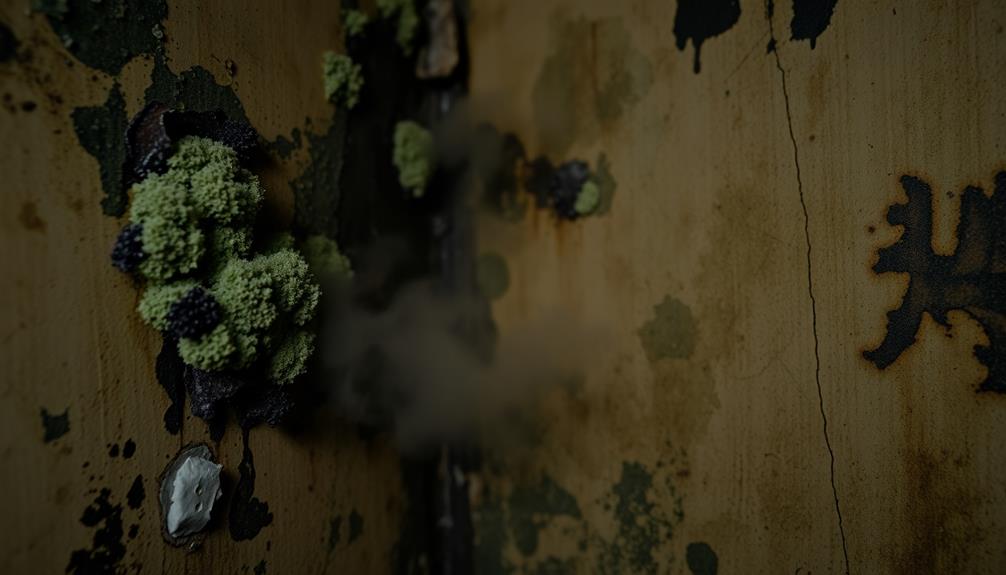
The musty smell that fills your space has a direct source: mold growth. When mold starts to grow, it releases tiny particles called microbial volatile organic compounds, or MVOCs. These compounds create those unpleasant mold odors you might notice. The smell can remind you of damp clothes, rotten wood, or even earthy scents.
If the odors are stronger, like sweaty socks or decaying matter, it usually means there's a serious mold infestation happening.
Environmental factors play a big role in how these musty smells develop. Things like moisture levels and temperature can change the intensity and type of mold scent in your home.
While musty scents often signal mold, not every musty smell means mold is present. Other factors can cause similar odors, too. So, if you catch a whiff of that musty scent, it's a good idea to get a professional inspection. This way, you can find out if there are any hidden health risks from mold.
Keeping your space clean and dry helps keep mold away, making it a happier place to live!
Typical Scenarios or Environments
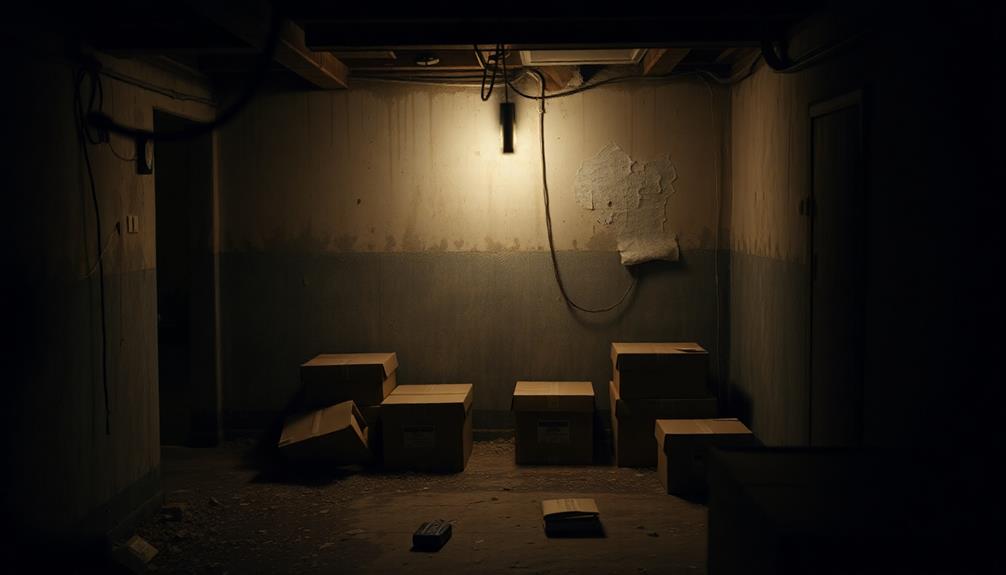
Musty odors often signal specific environments where mold thrives. You might notice these moldy odors in damp areas like basements, bathrooms, or anywhere with sources of moisture.
When water damage occurs, such as from leaking roofs or plumbing issues, the smell can become really strong and rotten. That's a clear sign that mold is growing, and it could cause health effects if not addressed.
In kitchens or pantries, mold can create a sour or fermenting smell, kind of like brewing yeast. If you detect strong earthy smells coming from hidden spots, like behind walls or in poorly ventilated spaces, it's time to take action.
These odors often come from microbial volatile organic compounds, or MVOCs, released by mold. Even after cleaning, those musty odors might stick around, which is why a professional mold inspection is important.
Detecting mold early can help prevent structural damage to your home. Remember, if you ever smell something musty, don't ignore it! Taking steps to find and fix the problem can keep your home safe and healthy for everyone.
Emotional or Cultural Associations

Mold's distinctive odor often stirs up feelings of discomfort and unease, signaling decay and neglect in our living spaces. When you catch a whiff of that musty odor, it might remind you of damp basements or old houses where you felt a little scared. Many people have emotional reactions to mold smells, linking them to childhood memories that stay with them.
In different cultures, mold smells can carry some serious meanings. Sometimes, they symbolize bad luck or misfortune, making folks avoid homes with mold problems. This can lead to a perceived lack of cleanliness or care in our home environment, which affects how others see us in community settings.
However, let's not forget that some people find nostalgia in mold's earthy scent! It might remind them of forests and nature, where decomposing leaves create a rich, organic smell.
Health or Safety Considerations
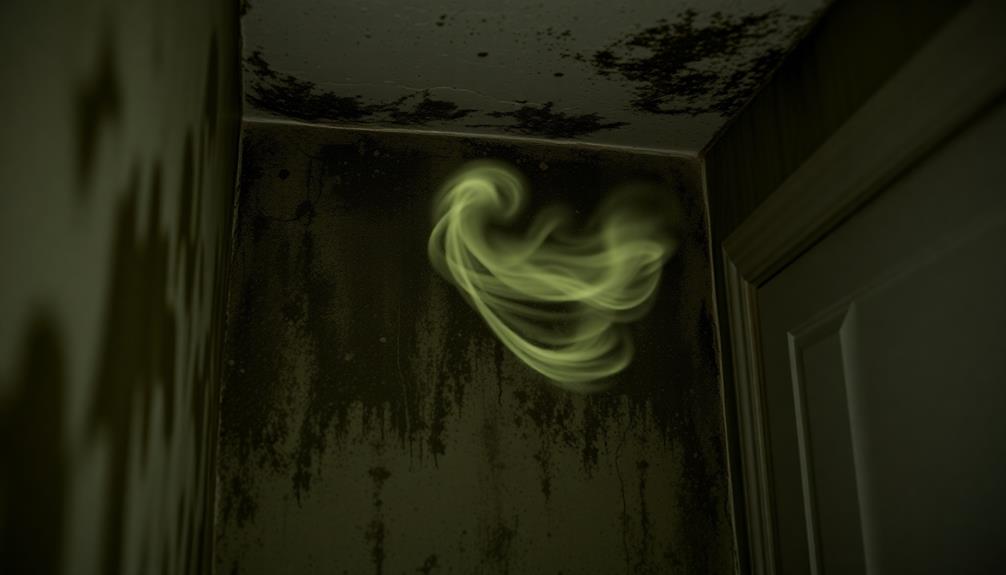
Catching a whiff of that familiar musty smell can be more than just an unpleasant reminder of decay; it can signal potential health risks lurking in your environment. Mold exposure can lead to various health symptoms that you definitely don't want to ignore! If you notice that musty odor, it's important to address it quickly.
People, especially children and the elderly, may face allergic reactions or respiratory problems from mold. You might experience coughing, sneezing, or even headaches. If someone has a compromised immune system or asthma, mold can cause serious health issues, especially with prolonged exposure. It's like a sneaky villain that can make existing problems worse!
Even after you clean mold, that musty odor can linger because of tiny particles called microbial volatile organic compounds (MVOCs). So, if the smell is still there, it's a good idea to keep looking for mold.
Final Thoughts
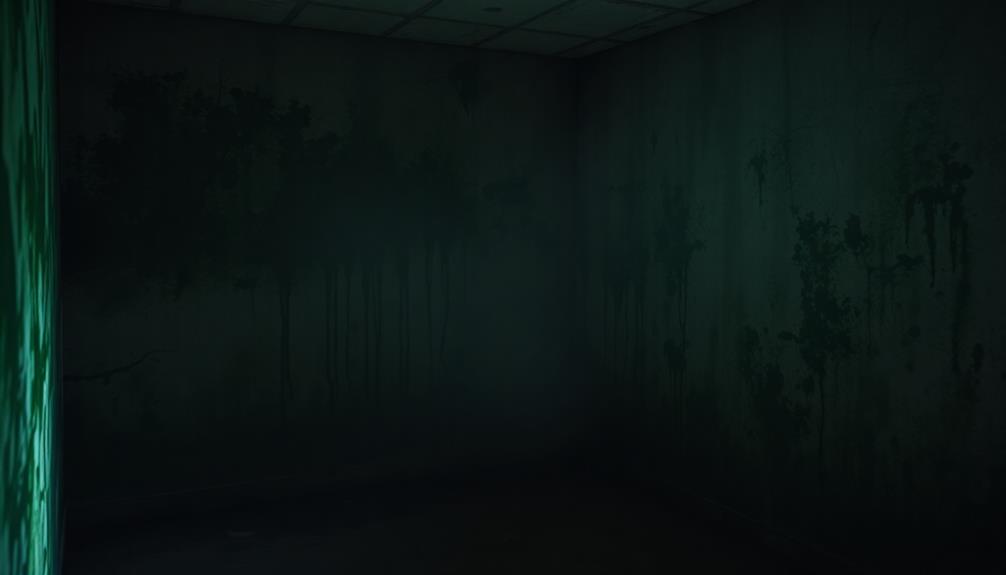
When you encounter that unmistakable musty smell, it's essential to take action rather than dismiss it. That mold odor can be more than just a nuisance; it often signals signs of mold infestation in your home.
You might notice that the smell mold resembles damp earth or even wet socks. This musty odor comes from microbial volatile organic compounds that mold releases as it grows. These compounds are a natural byproduct of mold’s metabolic process, and their strength can vary depending on the type of mold and the surface it’s growing on. Interestingly, certain fungal infections on the body produce similar odors. For example, scalp fungus odor description often notes a stale or sour smell, which is caused by the same kind of microbial activity found in mold growth.
Don't ignore that smell! It's important to inspect your home to find the source. By doing so, you can help reduce and prevent mold, which is crucial for your health.
Mold can cause health risks like allergies and respiratory issues, so getting a professional assessment is a smart choice. Mold remediation may be needed to clean up any hidden growth.
Frequently Asked Questions
How Do I Know if I'm Smelling Mold?
To determine if you're smelling mold, pay attention to musty odors similar to wet socks or stale wood. Check areas with moisture, like bathrooms or basements, for dark spots or visible mold growth.
Can You Smell Mold Behind Walls?
Yes, you can smell mold behind walls. If you notice a musty odor, it might indicate hidden mold growth. Check for water stains or discoloration, and consider a professional inspection to confirm its presence.
What Can Smell Like Mold but Not Be Mold?
You might encounter musty odors from damp wood, old books, or decaying organic matter that aren't mold. Bacteria or non-toxic fungi can also emit similar smells, so don't assume it's mold without investigating further.
Does Mold Smell Like Rotten Eggs in the House?
No, mold doesn't smell like rotten eggs. Instead, it emits a musty odor, often resembling damp clothes. If you smell rotten eggs, check for gas leaks or other issues rather than mold. Stay safe!

